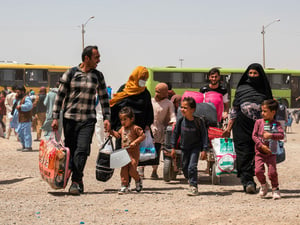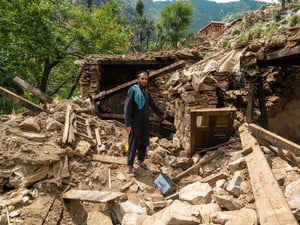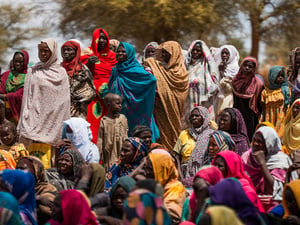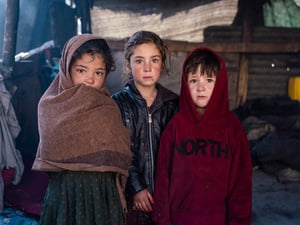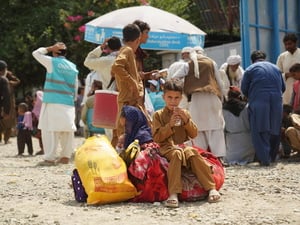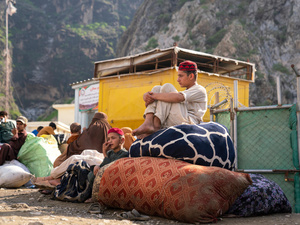German foreign minister explores situation of Afghans in Pakistan
German foreign minister explores situation of Afghans in Pakistan

German foreign minister Frank-Walter Steinmeier examines the biometric features of the Afghan Proof of Registration (PoR) card.
PESHAWAR, Pakistan, May 29 (UNHCR) - Better understanding of the refugee situation in Pakistan and management of population movements topped the agenda during a recent visit by German Foreign Minister Frank-Walter Steinmeier to witness the Afghan repatriation from north-western Pakistan.
Steinmeier and his delegation visited Afghanistan and Pakistan last week in preparation for the June 6-8 meeting of the Group of Eight (G8) leading industrialized nations and upcoming European Union (EU) foreign minister meetings in Germany. The aim of the visits was to discuss and agree on issues which could be raised in these high-level meetings and in direct consultations planned in Germany with the foreign ministers of Pakistan and Afghanistan. Germany currently holds the rotating presidency of the EU and G8.
Last Wednesday, the delegation travelled to the UN refugee agency's voluntary repatriation centre (VRC) in Peshawar, North-West Frontier Province in Pakistan. UNHCR Pakistan's assistant representative, Kilian Kleinschmidt, briefed the German foreign minister about the overall situation, with particular emphasis on the recent Afghan registration exercise, repatriation and plans for camp closure.
"Pakistan is home to the world's largest refugee situation, the largest assisted repatriation in modern history and the largest registration of refugees ever conducted," said Kleinschmidt. "More than 1 million Afghans have been processed by UNHCR through this VRC in the last six years, which makes it the largest repatriation centre in the world."
During his visit, the foreign minister witnessed the Afghan repatriation process, which includes physical and biometric verification, deregistration and iris verification. He expressed his appreciation for the efforts by UNHCR and stated how "amazing it was to see the world's most modern technology applied in this environment."
His main focus, however, was how the international community and Germany could contribute efficiently to the management of population flows between Pakistan and Afghanistan. As a result, he insisted on carrying to the G8 meeting a sample Proof of Registration (PoR) card issued after the Afghan registration exercise and a biometric border crossing card issued by Pakistan's National Database and Registration Authority (NADRA), "to show my colleagues what could be do-able in Pakistan and Afghanistan if we bring them together."
The repatriation of PoR holders started from April 19 this year and will continue till the end of the year. Some 20,000 registered Afghans have so far chosen to repatriate with UNHCR assistance averaging $100 per person.
The Pakistan government reiterated that unregistered Afghans would be considered illegal immigrants and would be dealt with under national laws. However, undocumented Afghans were given a six-week window from March 1 to April 15 to repatriate in safety and dignity with UNHCR assistance. Unprecedented anti-fraud measures were taken at the VRCs, including thorough interviews, fingerprint biometrics, iris verification and the use of election ink to prevent recycling. More than 200,000 Afghans repatriated over those six weeks.
During his visit, the foreign minister also met the refugee elders of Katchagari camp, which is scheduled for government closure on June 15. Thanking the Pakistan government for over 27 years of generosity, elder Haji Dost Muhammad said, "If the government of Afghanistan gives us land and it is developed by the international community and all the basic facilities such as water, health and education are provided, we are ready to repatriate." He added that those who cannot return must have viable relocation options.
New dates for closure of four camps in Pakistan were agreed at the 12th Tripartite Commission meeting between the governments of Pakistan and Afghanistan, and UNHCR in February this year. Besides Katchagari, Jalozai camp (also in NWFP), Jungle Pir Alizai and Girdi Jungle camps (both in Balochistan province) will also be closed. Together, the four camps host more than 220,000 Afghans, who have been asked to choose between assisted voluntary repatriation and relocation to an existing camp in Pakistan.
Pakistan has hosted one of the largest refugee populations in the world for nearly three decades. Although it is not party to the 1951 Refugee Convention or its 1967 Protocol, the government has respected international protection principles. More than 3 million Afghans have voluntarily repatriated from Pakistan with UNHCR assistance since 2002, making it the largest such operation in the refugee agency's history.
By Rabia Ali in Peshawar, Pakistan

